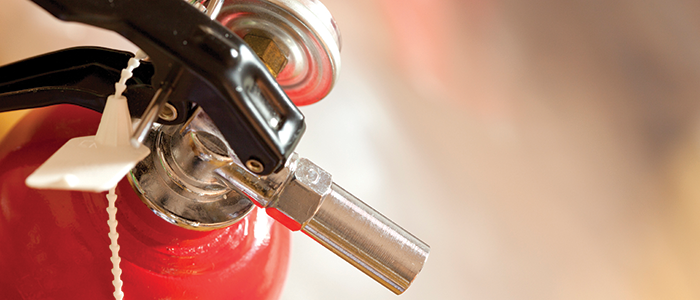Building a More Fireproof Business

2 minute read
It goes without saying that a total fire loss is a devastating event. One that may take years to recover from – and some businesses never do.
While most fires can be prevented, very often the cause of a fire is entirely unforeseen. When they do happen, it’s important to minimize the damage as much as possible. One of the best ways to do this is through careful planning and construction. Here are three ways that you can make your business more fireproof.
1. Fire detection
Why? Early detection is critical so the fire can be extinguished before extensive damage occurs.
How? Fire detection typically includes smoke and heat detectors which connect to the intrusion alarm and are monitored by the alarm company. Larger buildings may have alarms that are locally monitored on separate systems.
Bottom line? Installing a fire detection system, if you haven’t already, is highly recommended. Make sure that your fire system is installed by a professional, and up to provincial standards.
2. Sprinkler systems
Why? A properly designed and maintained sprinkler system can stop a fire in its tracks. The increasing size of commercial properties has made sprinkler systems more common.
How? These systems aren’t one-size-fits-all and must be designed specifically to the building’s occupancy to ensure they’re capable of extinguishing a fire. They also require annual inspections by a qualified sprinkler system contractor to make sure they’re fully functional. (Your insurer should routinely ask for sprinkler adequacy reports and annual inspection reports.)
Bottom line? Even though local building codes don’t always cite sprinkler systems as a requirement, they should always be considered when reviewing your building plans.
3. Fire separations
Why? The simplest way to prevent fire spread between buildings is by separating them. Restricting fire damage to a specific area will help your business return to normal as quickly as possible.
How? Use fire walls to create separate fire areas within the same building. Fire wall ratings can vary depending on the construction materials used. For example, non-combustible fire walls made from hollow, concrete blocks are common and often have a fire rating of 3 hours.
Bottom line? If you’re considering an addition to your current building or a new building, consider installing fire walls. The additional cost is significantly outweighed by the potential benefits.
For these fire solutions to work, each of them must be customized to your business by a professional based on the building’s occupancy, size, and local building code. But even where local building codes don’t require these solutions, there’s a good chance it makes sense to implement them. After all, these small protective measures might save you years of recovery.
Protect yourself and your business
Unfortunately, you can’t always control what happens to your business, especially when it comes to fire. You can, however, control how prepared you are. Having the right protection in place for your business can make a huge difference. To learn more, visit our Business Insurance page today.
This blog is provided for information only and is not a substitute for professional advice. We make no representations or warranties regarding the accuracy or completeness of the information and will not be responsible for any loss arising out of reliance on the information.






